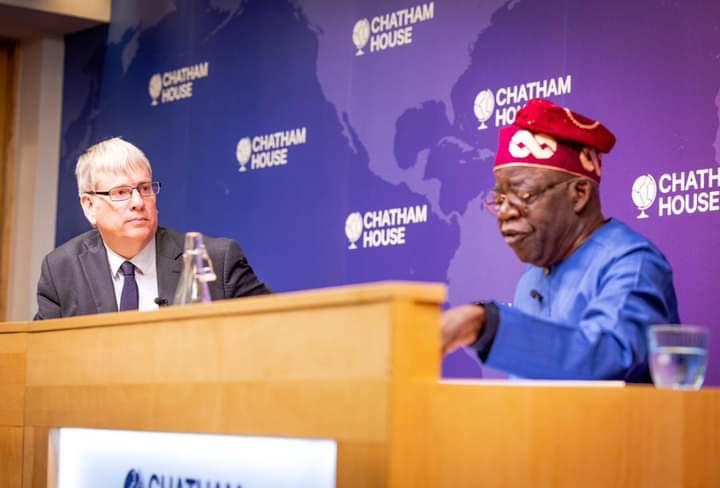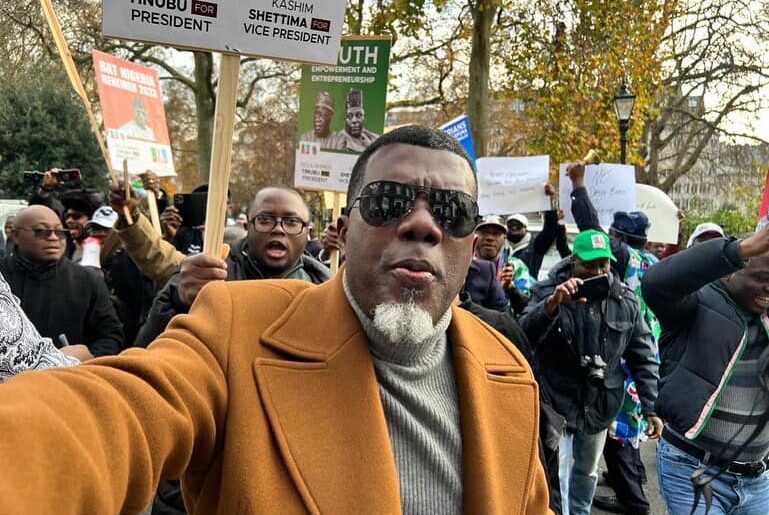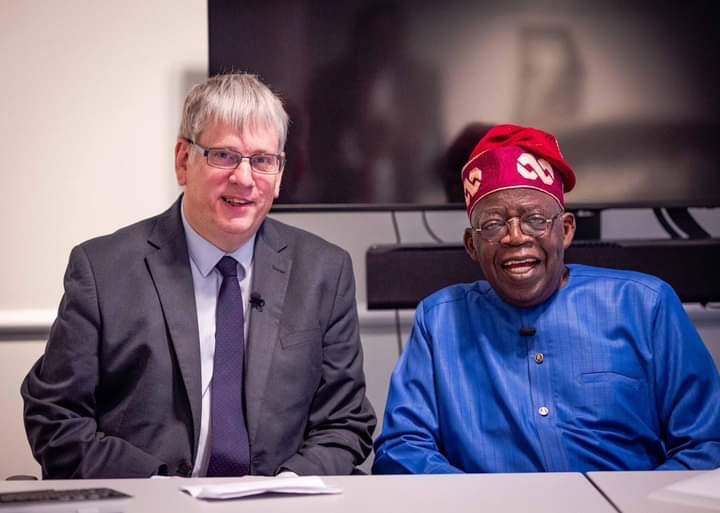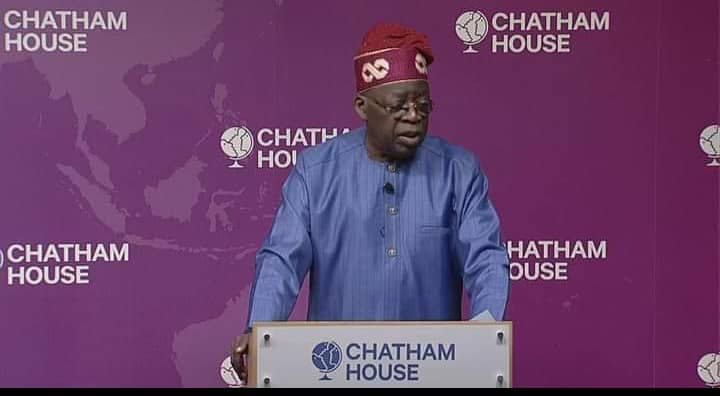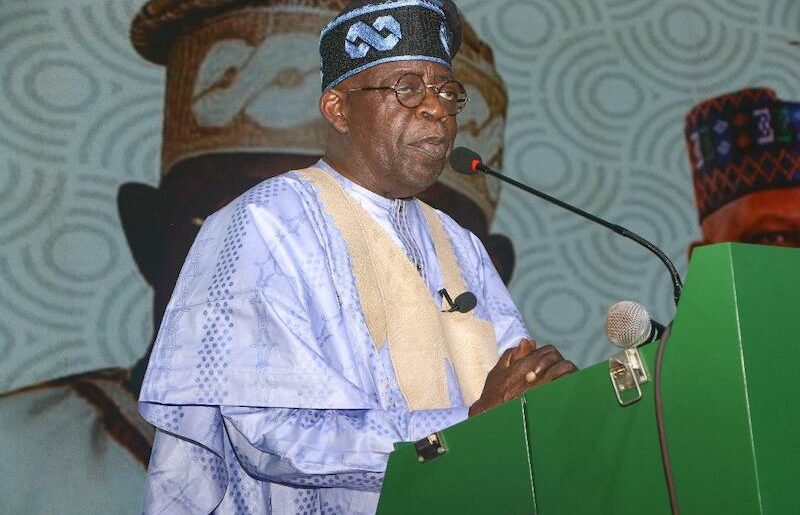By Tunde Rahman
It was another glorious moment in his campaign for the presidency of Nigeria. The All Progressives Congress Presidential Candidate Asiwaju Bola Tinubu was outstanding as he addressed the elite audience at the Chatham House London, that intellectual powerhouse for exchange of ideas on Monday, December 5.
He spoke with clarity on the challenges confronting the country and the solutions they require. His thoughts on how to move Nigeria to greater heights, rekindling their hopes in a greater tomorrow, were clear, unequivocal and realistic. Part of the solutions he offered is contained in his Action Plan for Renewed Hope in the country.
At Chatham House, Asíwájú Tinubu spoke on three main issues namely security, economic and foreign policies. His address was titled “Nigeria’s 2023 Elections: Security, Economic and Foreign Policy Imperatives.”
He was making a return to that elevated podium having also delivered a lecture there in 2011 as a leading opposition figure in Nigeria. He was also at the House with President Muhammadu Buhari in 2013 shortly after forming the APC, a coalition of progressives from the North and South of the country, which went on to win the presidential elections in 2015 and 2019.
To say Tinubu seized the moment at Chatham House last Monday is an understatement. He delivered an excellent address. To lend credence to this, the speech was punctuated at every turn by incessant thunderous applause. The moderator of the event, who is also the Managing Director, Ethics, Risk and Resilience of Chatham House and Director Africa Programme, Dr. Alex Vines OBE, demonstrated a deep understanding of the issues in Nigeria’s politics and elections and the person of Asíwájú Tinubu who he described as a former governor of Lagos and prominent politician who is no stranger to the House.
The build-up to the lecture was interesting. Asiwaju’s train comprising governors, former governors, APC leaders and principal aides had berthed in London on Saturday, two days prior to the event. A few dignitaries including Governor Nasir el-Rufai of Kaduna State had even hit London much earlier. Everyone was excited about the event given the significance of the address and that of that internationally respected platform. Chatham House is a big platform for top political gladiators across the world to showcase themselves and the ideas they have to move their countries forward.
Among those who accompanied him to the lecture were House of Representatives Speaker Femi Gbajabiamila, eight state governors from Nigeria, namely el-Rufai (Kaduna), Abdullahi Umar Ganduje (Kano), Dapo Abiodun (Ogun), Babajide Sanwo-olu (Lagos), Abubakar Sani Bello (Niger), Ben Ayade (Cross Rivers), Abubakar Badaru, (Jigawa) and David Umahi (Ebonyi) as well as two former governors, Dr. Kayode Fayemi (Ekiti) and Comrade Adams Oshiomhole (Edo).
There were also members of APC National Working Committee particularly the Woman Leader Edu and her deputy, Hajiya Zainab Ibrahim, as well as former deputy governor of Lagos, Chief Femi Pedro; former Lagos Commissioner for Information Alake; and his former Finance counterpart, Mr. Olawale Edun,
At Chatham House, Tinubu offered clear directions on security, economy and foreign policy. The kernel of his address bears restating here. He began by highlighting the values inherent in democracy, stating that Nigeria under his watch would epitomise the values of democracy during elections anywhere in Africa by ensuring that democratic ideals are followed and all forms of electoral violence rejected, allowing only the will of the people to prevail.
He assured that on his part, he would stand firmly against all forms of electoral violence and intimidation, having spent most of his career in the political opposition. “I have long fought against electoral malpractice and any attempts to extinguish the legitimate choice of voters. I will continue to do so,” he said.
On foreign policy, Asiwaju emphasised Nigeria’s role in Africa as a big brother, which has continued to be a beacon of hope to the continent and the ECOWAS sub-region, stating that when he becomes Nigeria’s president, his administration will continue to provide quality leadership to the sub-region, to ensure democratic ideal are formed in nations of the ECOWAS region.
“For one, as Africa’s most populous country and the continent’s largest economy, it is generally acknowledged that the fortunes of the African continent and indeed the Black race is tied directly to the health of Nigeria,” he said, while noting that Nigeria shares direct land borders with four African countries with whose peoples Nigerians also share historical and cultural affinities.
“This effectively means that the relationship between Nigeria and its immediate neighbours is much more than just a geographical expression. To be fully secure at home, Nigeria has always believed it must be the brothers’ keeper,” he pointed out. Maintaining that the broad principles that enabled successive Nigerian governments to interface development and security, and establish an organic link between national security and economic development with regional peace and prosperity is both impeccable and remains relevant, he promised that such is an approach which he is committed to upholding and advancing.
To respond meaningfully to the discontents and to redress the many dislocations arising from them, the APC candidate said Nigeria must begin by “reminding ourselves of that old dictum: foreign policy is but a continuation of domestic policy. As a first step, we must recalibrate domestic policy in order to revamp the foundation on which our quest to pursue human security rests.”
On security, he promised to frontally tackle the situation the country is facing, so that Nigeria can also effectively provide security support for its neighbouring nations. “The challenges which have manifested themselves with regard to our national and regional development and security trajectories are very well-known to all of us here: radical extremist violence, terrorism, banditry, kidnapping, human trafficking, trafficking in weapons, trafficking in drugs, climate change and resource-driven conflicts, etc.”
The economic blueprint he enumerated at Chatham House remains instructive. It will prove helpful in returning Nigeria to where it ought to be. For instance, Asiwaju promised to improve the framework already in place to boost the generation and distribution of energy across the country, reiterating that effective energy generation and distribution will help build the economy of the nation.
He stated that the nation under his watch would place emphasis on the use of technology to improve the agricultural sector for better production and contribution to the nation’s economy. “The present administration has invested heavily in agriculture, providing loans and expanding the country’s total acreage of cultivated land. We will build on this, but our focus will be on using technology and expertise to accelerate growth and development by providing the critical infrastructure necessary to achieve the commodity transformation in the agriculture value chain.
Also prioritising fixing the perennial riddle of energy supply, Asiwaju said there is no version of the world where Nigeria’s ambitions for itself can be achieved without solving the problem of how to provide energy to homes and businesses across the country. “It is time to recognise that the centralised approach to energy policy and infrastructure is not an optimal arrangement and is unlikely to improve by mere tinkering around the sides,” he said.
While promising to engage the private sector to better drive economic development across the country, he said the government could not continue to be the regulator and operator. This is how he put it: “The Federal government as regulator and operator, and price fixer is a broken model and one that we fully intend to fix if elected. We have privatised power distribution in Nigeria and generation to a certain degree. What we need to do, going forward, is to improve the enabling environment and further reform the legal and regulatory framework to attract more private investments in the sector as we have experienced in the telecom industry.”
He pointed out that his belief that the private sector is the fulcrum of economic progress is evident and documented, adding, however that, “fundamental flaws with the basic design of our national economy imperil the private sector from playing the role it ought to and adding the value it is capable of. In this instance, the government must act as a catalyst.” This he promised to do on all fronts, one of which is to address the conflict between monetary and fiscal policies. Also, budgeting will be based on the projected spending levels needed to push the real annual growth rate above 7 per cent while reducing the unemployment rate so that we can double the economy in ten years.
After the address, Tinubu fielded questions from the audience in the hall. Now, the opposition and their fawning media have tried unsuccessfully to belittle the success of the programme. They tried to devalue the evident gains of the lecture by upbraiding Asiwaju for asking some in his team to respond to some questions. It would have been a big surprise if the opposition did not behave to type. Tinubu has never pretended to be a superstar; a man who has all the answers. Asiwaju’s success as governor of Lagos State was predicted on teamwork and recognition of talent. Asiwaju believes in team spirit, a tradition he had long established and demonstrated as governor of Lagos. He does not believe in taking personal glory; he would allow team members an opportunity to share the limelight. For instance, taking the question on youth development, he singled out Lagos Governor Babajide Sanwo-Olu in the hall, describing him as a youth running the state that is the 5th largest economy in Africa and improving on the legacies he left behind as governor.
It is important to add that a total of ten questions were asked. Asiwaju took six by himself. He asked some of those in his team to respond to four. Even in those responses, his interjections were sharp and punchy. That is the leader some would shamelessly accuse of dodging scrutiny. By his decision, Asíwájú had shown to the whole world his inimitable leadership style and the robust team he would put together if elected president, as he did as governor of Lagos State. Indeed, reviewing the entire programme, a research fellow at Chatham House who sat beside this writer during the address stated that one thing is clear though: “Your principal has demonstrated the great team he has and will deploy in the business of governance if elected.” Any need to add more on the misplaced and misdirected criticism of the APC candidate!
*Rahman, Media Aide to Asiwaju Tinubu, was previously Editor of THISDAY on Sunday


